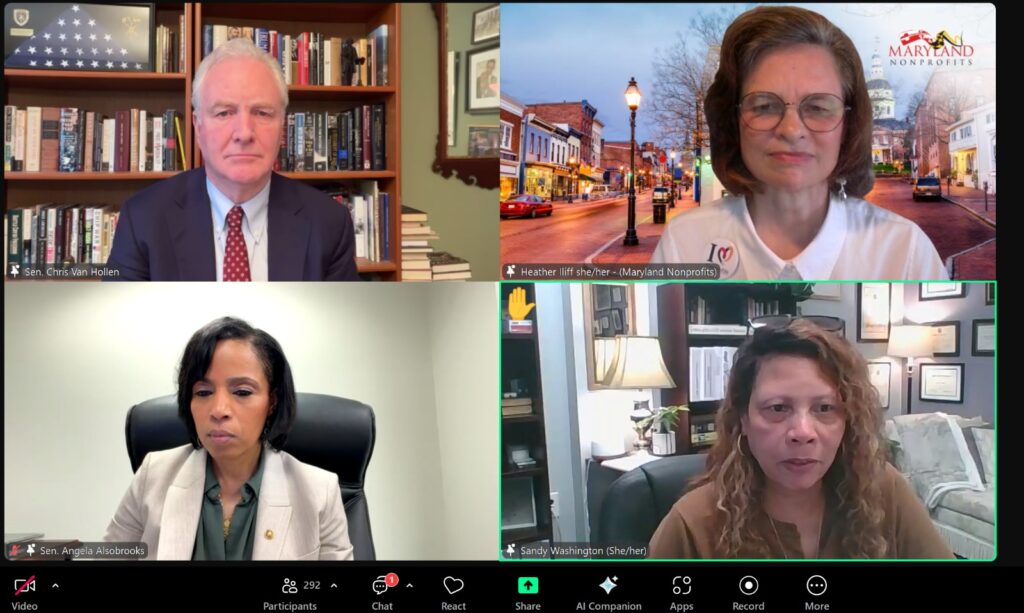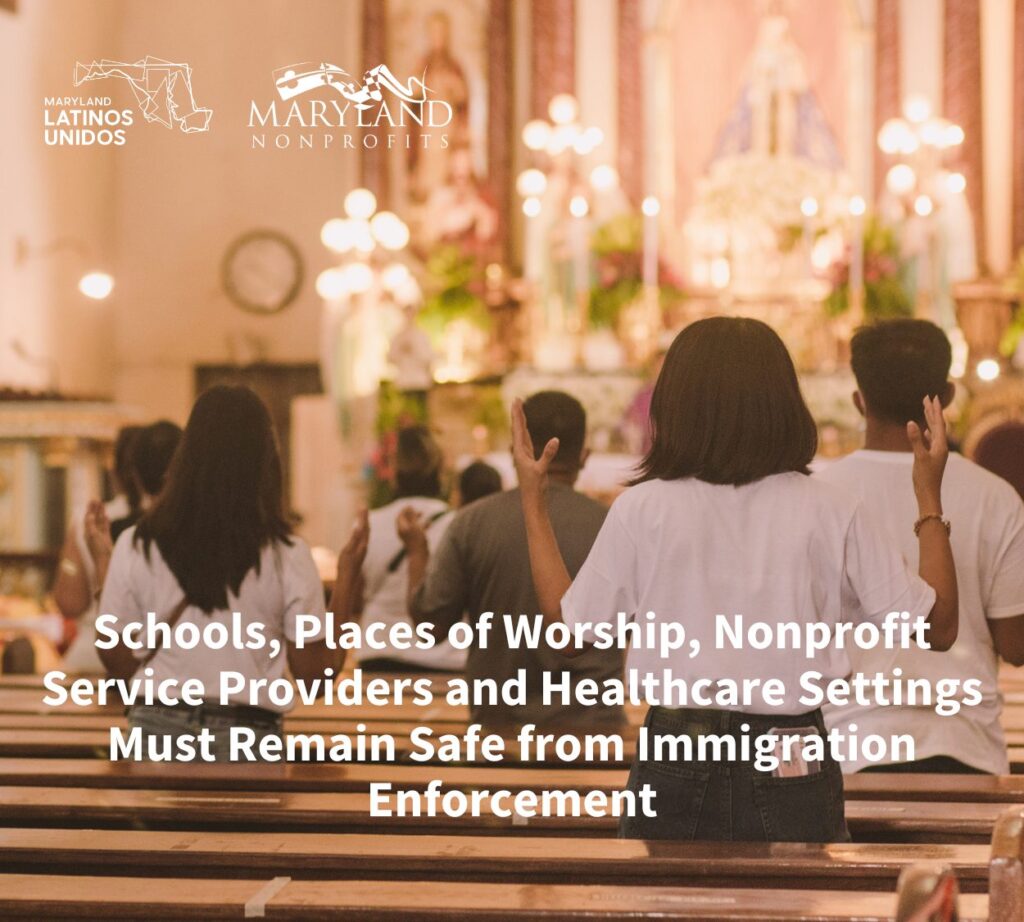Policy Principles and Priorities





We are dedicated to empowering organizations to make a greater impact on the policy issues affecting their communities and missions. Each year, our priorities and principles are shaped by collaboration with nonprofits across Maryland to ensure alignment with sector needs.
At Maryland Nonprofits, we amplify the sector’s voice on behalf of the people and causes nonprofits serve. Our Policy Priorities and Policy Principles guide this work, ensuring that we lead efforts to build a fairer, more inclusive economy.

A just and equitable society in Maryland, and our future growth, well-being and economic prosperity can only be assured when everyone can share fairly in a prosperous and inclusive economy without race-based or other structural barriers that impede them.
Decades of state fiscal constraints have already degraded the effectiveness and efficiency of state agencies and nonprofit organizations working with them, to improve education, housing, health care, nutrition, child welfare, protective services, workforce development and other services essential to our quality of life.
Now Maryland faces an ongoing effort by federal executive leadership to pull back and disengage from a wide range of programs and funding significant to many or most of the general population, and critical to people already facing vulnerability or hardships from poverty or systemic discrimination. From advanced health and scientific research to basic nutrition and shelter, all aspects of life are impacted.
Federal Leadership is also subjecting nonprofits to threats and intimidation for serving needs or causes it deems inconsistent with their own view of ‘American values’. They also threaten to reduce or remove the charitable sector’s long-standing protection in the Internal Revenue Code from political partisanship.
Maryland Nonprofits’ policy priorities for 2026, and the specific reports of members in our annual policy survey, reflect these needs and conditions.

The Governor and General Assembly must address the changing relationship of all the states to the federal government. Since January of this year, and particularly in legislation called by some the One Big Beautiful Bill, support for critical programs is being reduced or terminated. Costs and responsibilities are being shifted or left to the states, allowing the national government to reduce taxes paid primarily by the wealthy and major businesses.
Correspondingly Maryland must adjust or revise its revenue structure to meet this challenge or accept the gradual but inevitable decline of our quality of life. Maryland Nonprofits continues to join and support the efforts of the Fair Share Coalition to assure an adequate, fair and sustainable budget for our state.
Maryland Nonprofits will be seeking funding to renew the Nonprofit Accelerator Program, providing critical back-office services for smaller nonprofits, offering services and assistance in grant-seeking, and provides intensive training in nonprofit basics and nonprofit leadership. The program is designed to support small and mid-sized organizations, with an emphasis on organizations led by people of color, rural organizations and others who otherwise would not be able to afford the back-office, consulting and mentoring services they need to sustainably grow their organizations.
As our state grapples with losses of federal support and programs, nonprofit sustainability and community resiliency is even more critical to build a strong and inclusive economy and communities. The Accelerator creates lasting capacity within Maryland for more organizations to leverage additional funding into the state from federal and philanthropic sources.
For more than seventy years the Internal Revenue Service has enforced a provision added to the Internal Revenue Code in 1954, that churches and other charities “may not participate in, or intervene in (including the publishing or distributing of statements), any political campaign on behalf of (or in opposition to) any candidate for public office.”
That provision is now threatened by legislation pending in Congress, litigation pending in federal court, and a reversal of position by the IRS. Maryland must act to protect by state law the objectivity and effectiveness of our religious and other charitable organizations by assuring they remain insulated from partisan pressures of electoral politics.
Advancing social and economic justice and inclusion, removing impediments to economic opportunities and advancement, and assuring everyone the opportunity to live in safe and environmentally sustainable communities, requires achieving progress on many inter-connected and inter-dependent policy objectives. Maryland Nonprofits will promote and support the efforts of the many nonprofit advocates and coalitions that are working to attain these goals:

Maryland’s future success depends on creating an economy where everyone—regardless of race, age, gender identity, religion, socioeconomic status, or disability—can thrive without facing structural barriers.
Public policies must be assessed for their impact on the health, opportunities, and quality of life of all individuals and communities. This approach ensures that proposed and existing policies promote equity and inclusion, creating a more just and prosperous future for all.
Government exists to promote the general welfare, and nonprofits, sharing this mission, should lead in advocating for policies that ensure strong public investment in community services. Government budgets and fiscal policies must allocate sufficient resources to meet community needs equitably.
Operations and programs should be fair, efficient, and accountable. Additionally, the system for raising government revenue must be both efficient and equitable, with an emphasis on progressivity to ensure fairness.
The nonprofit sector should champion policies that enable meaningful public involvement in government. Government processes must be transparent, open, and guided by the people and their elected representatives. While free expression is a fundamental right, it is most effective when the public’s voice is truly heard.
All branches of government must ensure transparency and accessibility to engage the public and foster understanding. Policymaking should reflect public input and prioritize the best interests of all, especially traditionally disenfranchised groups. Elections must be conducted to maximize voter participation and ensure the people’s will guides governance.
Nonprofit organizations play a critical role in delivering public services, complementing government efforts and addressing unmet needs. Nonprofits also implement government programs and contribute significantly to Maryland’s economy, employing over 250,000 workers. Public policies must recognize and support this vital partnership.
State contracting procedures should streamline nonprofit service delivery and ensure adequate funding. Economic development strategies should include nonprofits and the communities they serve. Additionally, tax policies that support the nonprofit sector’s charitable work must be preserved, and policies should protect the integrity of nonprofit activities.
Public policy must acknowledge and support the critical role of private philanthropy and volunteerism in enhancing the well-being of Maryland residents. Current incentives for charitable giving should be maintained, while new strategies to encourage philanthropy and volunteer service should be explored.
Collaboration between government, businesses, and nonprofits is essential to developing effective programs that promote and sustain both philanthropy and volunteerism across the state.
Nonprofits play a vital role in advocating for the individuals and communities they serve. Advocacy is a natural extension of their mission, enabling nonprofits to educate the public and amplify community voices on important policy issues. Public confidence in the policymaking process depends on effective nonprofit advocacy.
The nonprofit sector must encourage greater participation in policy advocacy, strengthen its ability to lead on key issues, and engage the public in these efforts. Barriers to nonprofit advocacy should be actively challenged, and nonprofits must have representation on relevant government boards and commissions.






